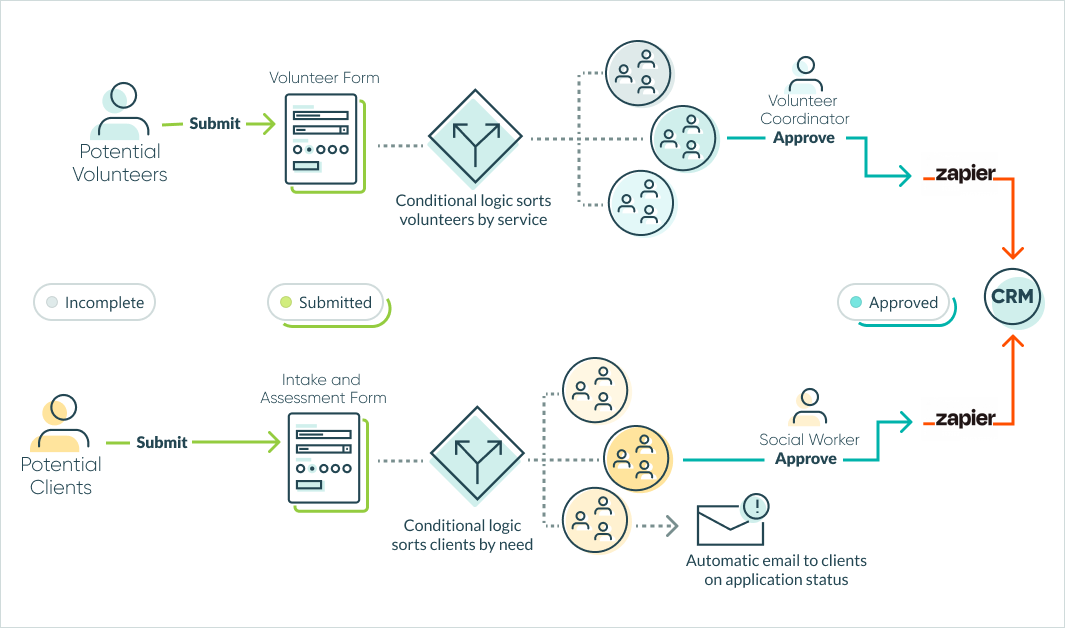Rani Cruz, the Director of Development and Impact for Welcome Collective, created a data workflow consisting of over 100 forms with Cognito Forms to capture newcomers’ needs and reduce social workers’ workloads.
Welcome Collective/Collectif Bienvenue was founded by a group of friends in Montreal, Canada, who came together with a shared passion: to mobilize the local community to provide immediate help to the city’s refugee claimants (asylum seekers). Since then, it has grown into a team of 16 staff and over 300 regular volunteers.
They provide secondhand furniture, household items, clothing, and psychosocial support to those in need. And after more than six years of operation, they’ve streamlined their data process by creating a series of forms with Cognito Forms to collect data from refugees, staff, and volunteers.
Cruz initially created the system using Google Sheets and Google Forms, but she quickly realized it was limited in its complexity. So, she tried different form builders and landed on Cognito Forms as the best choice. Why? It is easy to use and affordable, and features like conditional logic and lookup fields became essential to optimizing their data collection.
Adapting to a Data-Driven System
The Welcome Collective needed efficient and comprehensive data management within their nonprofit organization to better serve refugees and streamline organizational processes.
Adaptation is critical in the evolving landscape of nonprofits. Cruz saw the necessity of creating a system that integrated data into their workflow without burdening social workers or incoming refugees.
“We have to gather data like which shelters they’re living in, or where they originally came from, how many school-aged children they have - it’s so much information. And we can only do that with very responsive technology.”
After directly observing and collaborating with frontline workers, she identified opportunities to simplify processes and create actionable data.
Establishing a Workflow
The Welcome Collective utilizes various internal and external forms at the center, including forms for client intake, social workers requesting items and services for their clients, volunteers, and furniture donors providing information about the items they wish to donate.
External users such as volunteers, donations, general information queries, partnerships, or newsletter subscribers can easily follow a clear path and make targeted decisions based on their choices.
“Conditional logic helps us fine-tune the kind of volunteers they are, the client’s needs, or the kind of donations coming through,” says Cruz.

Integrating Cognito Forms and Their CRM
The data from the forms integrate through Zapier and connect to Welcome Collective’s centralized Customer Relationship Manager (CRM), Streak. Streak helps the team to handle confidential or sensitive personal information and further sort the data.
“The combination of the conditional logic in Cognito forms, Zapier integration pathways, and the Streak CRM helps do many early decision-making for us,” says Cruz.
She can effectively sort potential clients and volunteers through the connection and notify the right people at the right time with custom email notifications.
“I can very quickly add a volunteer interested in a certain type of volunteering. It will put it in a stage right away. The forms really help with streamlining that.”
Automatic emails were set up to send notifications to specific people depending on what their users select. “That’s saved us endless hours of being on the phone asking those questions or making those decisions yourself. It also takes the bias out of it.”
As the amount of data increases and the integrations between forms become more complex, the forms constantly evolve as the organization develops new metrics to track.
How Can Nonprofits Create a Similar System?
According to The National Council of Nonprofits, organizations around the country are reporting significant difficulties retaining staff and filling vacancies.
“We only have 16 employees and last year were able to help over 10,000 people in person. We also hosted online workshops for over 1,000 people. For 16 people, it was a lot,” says Cruz.
Nonprofit organizations face more resource constraints than ever before, making it challenging to meet the growing needs of their community. To bridge workflow gaps quickly and ensure smooth operations, organizations must adapt to evolving technology. The right technology, like Cognito Forms, empowers nonprofits to develop innovative solutions that drive them forward instead of always struggling to catch up.
Starting with something very simple like building a form really empowers a nonprofit because they can gather the data that they need.
Rani Cruz
“For example, they now have the data to write a grant. The information that comes out of your work is super important to keep your organization going and sustainable.”
Whether you need to create a system to manage volunteers or coordinate a specific fundraising event, Cognito Forms makes it easy to build a custom and affordable solution. And with Workflow automation features, it’s possible to reduce the amount of manual labor required for each process. You’ll not only improve communication across your team, but you’ll also collect data as efficiently as possible.
Cruz hopes that sharing the features of Welcome Collective’s data flow with Cognito Forms will emphasize the importance of responsive technology in nonprofits.
